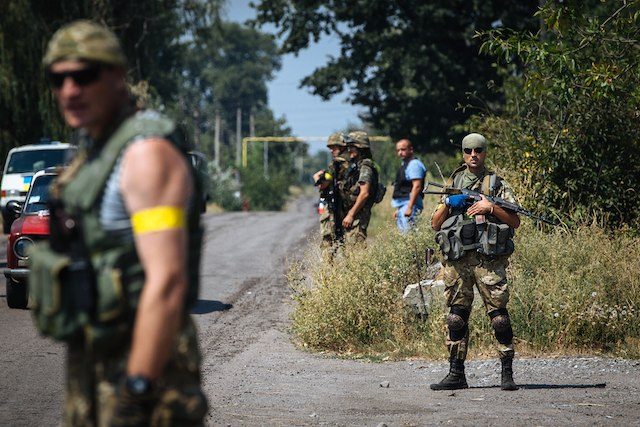SUMMARY
This is AI generated summarization, which may have errors. For context, always refer to the full article.

KIEV, Ukraine – The Ukrainian army and pro-Russian rebels were due to start pulling back heavy weapons from the frontline on Wednesday, December 10, a day after a ceasefire that aims to end 8 months of brutal war in the east of the country.
Residents in the main rebel stronghold of Donetsk experienced an unfamiliar silence overnight as a tentative truce appeared to be holding, according to Agence France-Presse (AFP) journalists.
Interviews with people along the frontline confirmed the ceasefire was being largely respected throughout the conflict zone.
A tank commander in Tonenke near the contested airport in Donetsk said “there has been calm for 24 hours.”
In Pisky, a village controlled by the Ukrainian army near the airport, volunteers with the ultranationalist Pravy Sektor group said there was sporadic gunfire and “very rarely” some heavy artillery shots, but the peace was largely being observed.
If this ceasefire – the fourth since the separatist war broke out in April – holds, both sides are due to start pulling back their heavy weaponry to create a 30-kilometer (20-mile) buffer zone on Wednesday.
There was less certainty over the fate of peace talks, which the government had hoped would start in the Belarussian capital Minsk at the same time as the ceasefire.
Rebel leader Andrei Purgin told AFP on Wednesday that the two sides were still discussing a date and agenda for talks, but he expected them to go ahead on Friday.
Another rebel leader, Denis Pushilin, said they were due to hold a video conference later in the day along with Russian and Western observers.
He said the rebels wanted to focus negotiations on ending the economic blockade of the two rebel-held provinces of Donetsk and Lugansk.
Kiev has cut off all banking and welfare services to the rebel-held areas in recent weeks, arguing that residents are being taxed by separatist leaders to fund the war.
Change of tack
The rebels also said they were open to discussing greater autonomy for the region, along with a prisoner exchange and amnesty for separatist fighters.
These points were part of an earlier ceasefire agreement in September which failed to stop the fighting. At the time, the rebels had rejected the offer of greater autonomy, saying they wanted full independence.
The change of tack may reflect new calculations in Moscow, which appears increasingly unwilling to sponsor the insurgency in eastern Ukraine.
Russia denies giving military backing to the rebels but Kiev and Western governments have presented an abundance of evidence to the contrary, triggering a level of diplomatic isolation and economic sanctions not seen since the Cold War.
Even German Chancellor Angela Merkel – long the voice of moderation when it comes to dealing with Russia – said this week: “Russia has violated, and continues to violate, international law.”
With Russia’s economy already in crisis from tumbling oil prices, the Kremlin appears to be looking for a way out of the crisis and there have been reports of a change of personnel in its Ukraine policy team in recent weeks.
“Russia didn’t expect such a profound change in attitude from Europe and especially Germany,” said Kadri Liik, an analyst at the European Council on Foreign Affairs in Brussels.
It is “slowly starting to realise that things haven’t worked out as hoped. The question now is whether Europe, and Germany in particular, can succeed in making Russia accept a face-saving way out.”
But even if the peace holds, Ukraine faces a mammoth task in winning back the trust of citizens in the east that have faced daily bombardments.
The United Nations says more than 4,300 people have died in the eight-month conflict, but many believe the final toll will be far higher when the fog clears. Almost a million have been displaced.
The economy is also on the brink of collapse.
A team from the International Monetary Fund (IMF) arrived in Kiev on Tuesday to assess the implementation of deeply unpopular austerity measures it has demanded in return for $17 billion in emergency aid. – Rappler.com
Add a comment
How does this make you feel?
There are no comments yet. Add your comment to start the conversation.